Well, it wasn’t as bad as Hitchin. If you’re looking for crumbs of comfort and straws to clutch at following Rovers’ first Cup defeat to non-league opposition since 1995, those of us who were at Top Field to see John Ward’s team dip to Isthmian League opposition at least had that. It’s been worse, just not for a long while – half a lifetime in my case – but three first round exits in a row since that quarter final appearance in 2008 are hard to take.
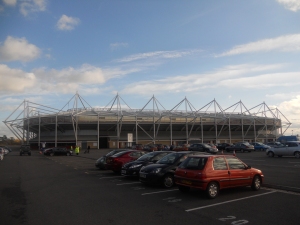 The Darlington experience is bizarre, bordering on the surreal to be honest. The story of how a small club, solid citizens of the bottom division with a small but respectable core support ended up vacating their cosy Feethams home in favour of the vast Darlington Arena is one that’s fairly well known, at least amongst lower league fans, but when you see the results up close it’s almost tragic. An identikit new stadium, the little brother of the bigger Riverside and Stadium of Light up the road, the only sections open are the South Stand along one side and the smallest slivers of the East and West Stands behind the goals. The remaining three quarters of each end and the entire North Stand are left empty, the preserve of some very lonely ball boys and nobody else. Even the sections in use were very sparsely populated yesterday, the crowd of 1,602 working out as a shade over 6% of the entire capacity of the ground. The effect was that the 150 away fans were very lonely and isolated at one end and the Darlington singers behind the other goal seemed similarly cut off from everyone else. It’s easy to sympathise with the plight of home fans who yearn for their former home, long demolished and due to become a housing estate, though I’m not sure donating them their first ever FA Cup win at their new home and first victory over Third Division opposition in over 20 years was the way to go about it.
The Darlington experience is bizarre, bordering on the surreal to be honest. The story of how a small club, solid citizens of the bottom division with a small but respectable core support ended up vacating their cosy Feethams home in favour of the vast Darlington Arena is one that’s fairly well known, at least amongst lower league fans, but when you see the results up close it’s almost tragic. An identikit new stadium, the little brother of the bigger Riverside and Stadium of Light up the road, the only sections open are the South Stand along one side and the smallest slivers of the East and West Stands behind the goals. The remaining three quarters of each end and the entire North Stand are left empty, the preserve of some very lonely ball boys and nobody else. Even the sections in use were very sparsely populated yesterday, the crowd of 1,602 working out as a shade over 6% of the entire capacity of the ground. The effect was that the 150 away fans were very lonely and isolated at one end and the Darlington singers behind the other goal seemed similarly cut off from everyone else. It’s easy to sympathise with the plight of home fans who yearn for their former home, long demolished and due to become a housing estate, though I’m not sure donating them their first ever FA Cup win at their new home and first victory over Third Division opposition in over 20 years was the way to go about it.
Rovers were forced into changes from the team that had competed well for the first three quarters of Tuesday night’s game in Plymouth, Stuart Campbell failing to recover from the injury that saw him taken off at Home Park and Mikkel Andersen being refused permission to play by Reading. The presence of John Akinde on the bench is a sign that his parent club are obviously committed to letting him go in January, though it’s a point of contention as to whether he’ll make his move across town permanent – to say he’s not done quite enough to convince so far would be something of a gross understatement. Wayne Brown and Mike Green took their places in central midfield and goal respectively.
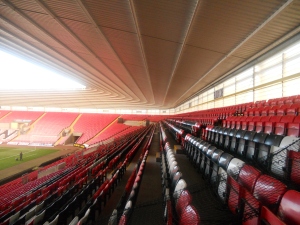 The game started quietly with few chances on offer in the opening fifteen minutes or so. Rovers dominated possession and what few shooting opportunities there were without looking completely in command and as the game wore on it was to become apparent that Darlington’s tactics were effectively to contain us and attempt to hit us on the break. Fifteen minutes in, one of those breaks produced the first goal, Green failing to deal with a cross from the Darlington right only pushing it out towards the man lurking beyond the far post. The ball was played back to the edge of the penalty area and Michael Brough drilled a low shot into the bottom left hand corner of the net. It was a well hit shot but you have to raise an eyebrow in the direction of Green who didn’t seem to get down very well to it and of course it was his failure to deal with the initial cross which led to the chance in the first place. It’s perhaps unfair to compare Greener to his first choice counterpart but experience tells us that Mikkel Andersen would have more than likely comfortably caught the ball or at least tipped it out for a corner.
The game started quietly with few chances on offer in the opening fifteen minutes or so. Rovers dominated possession and what few shooting opportunities there were without looking completely in command and as the game wore on it was to become apparent that Darlington’s tactics were effectively to contain us and attempt to hit us on the break. Fifteen minutes in, one of those breaks produced the first goal, Green failing to deal with a cross from the Darlington right only pushing it out towards the man lurking beyond the far post. The ball was played back to the edge of the penalty area and Michael Brough drilled a low shot into the bottom left hand corner of the net. It was a well hit shot but you have to raise an eyebrow in the direction of Green who didn’t seem to get down very well to it and of course it was his failure to deal with the initial cross which led to the chance in the first place. It’s perhaps unfair to compare Greener to his first choice counterpart but experience tells us that Mikkel Andersen would have more than likely comfortably caught the ball or at least tipped it out for a corner.
Already the game had the look of an upset, Rovers’ failure to make very much of their possession being wearyingly familiar to those of us used to the ups and downs of life under Paul Trollope. Thankfully – as we thought at the time anyway – we were soon back level after Will Hoskins was brought down by Liam Hatch a couple of minutes later. It was a controversial decision in that even from the other end of the ground it looked comfortably inside the penalty area yet referee Jock Waugh, several yards behind play, awarded only a free kick on the edge of the box. Any sense of injustice was eliminated when Hoskins drove a powerful free kick through the wall, Sam Russell in the Darlo goal getting something on the ball but not nearly enough to prevent it from going into the bottom corner. Back on terms and hoping to make sure the scare was only temporary, Rovers continued their domination of the possession and further unconvincing chances were made before Hoskins went close with another free kick which was to be his last significant contribution to the game.
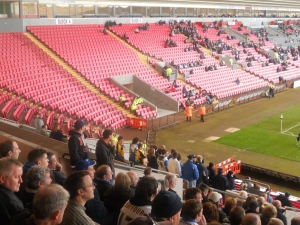 That was because the pivotal moment of the match occurred around the half hour when Hoskins was stretchered off with what is feared to be an ankle ligament injury after a meaty challenge. Darlington had been turning in what you could euphemistically describe as a ‘gritty’ performance and more accurately say comprised a lot more fouls than was reasonable and which the referee could have done more to clamp down on. That failure to do so culminated in losing our most potent attacking threat and, as it turned out, our best chance of staying in the FA Cup. The remainder of the half saw Darlo come into the game a bit more – well they had a shot – and assistant manager, former Rovers player Richard Dryden, sent to the stands for booting the ball away when we were awarded a free kick. The home management team had certainly been putting on something of a performance on the touchline and it wasn’t much of a surprise to see the referee take action eventually.
That was because the pivotal moment of the match occurred around the half hour when Hoskins was stretchered off with what is feared to be an ankle ligament injury after a meaty challenge. Darlington had been turning in what you could euphemistically describe as a ‘gritty’ performance and more accurately say comprised a lot more fouls than was reasonable and which the referee could have done more to clamp down on. That failure to do so culminated in losing our most potent attacking threat and, as it turned out, our best chance of staying in the FA Cup. The remainder of the half saw Darlo come into the game a bit more – well they had a shot – and assistant manager, former Rovers player Richard Dryden, sent to the stands for booting the ball away when we were awarded a free kick. The home management team had certainly been putting on something of a performance on the touchline and it wasn’t much of a surprise to see the referee take action eventually.
The second half opened with more of the same – Rovers attacking without a great deal of conviction once we reached the penalty area, Charlie Reece winning a corner with one shot – before the Quakers went in front again with a goal that once again owed something to some messy defending. A well executed break reached the penalty area with a nice little one-two, Brown managing to knock the ball onto the post as he raced back to try and clear up. The ball bounced straight back into the danger area for the onrushing Gary Smith to score and leave us with the same sinking feeling as on Tuesday night – coming back from one down to equalise is one thing but when being asked to do it again you wonder whether it’s within our ability to do so.
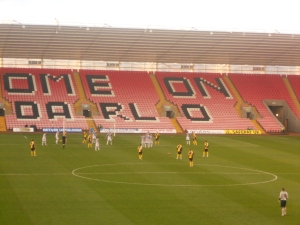 2-1 up with half an hour left, Darlington threw themselves into their tackles and blocks with even more vigour as Rovers, desperately missing the commitment and leadership provided by Stuart Campbell, again went forward in search of the goal that would save our embarrassment. Akinde followed up a good run from the left hand side of the area with a great shot that was turned away by Russell and Chris Lines hit a drive past the far post but much of the time our decision making was poor – one run across the face of the area by Lines stands out as, with Akinde begging him for a simple ball to play him in for a one on one, he chose to hit a wayward shot into the away fans. Jo Kuffour was virtually anonymous all afternoon and with Akinde turning in a typically enigmatic performance – the odd moment of inspiration dwarfed by the number of times he failed to challenge for a ball or was simply muscled out of contention by a more robust home defender – it made for something of a powder puff forward line when what we needed was a touch more urgency and muscle.
2-1 up with half an hour left, Darlington threw themselves into their tackles and blocks with even more vigour as Rovers, desperately missing the commitment and leadership provided by Stuart Campbell, again went forward in search of the goal that would save our embarrassment. Akinde followed up a good run from the left hand side of the area with a great shot that was turned away by Russell and Chris Lines hit a drive past the far post but much of the time our decision making was poor – one run across the face of the area by Lines stands out as, with Akinde begging him for a simple ball to play him in for a one on one, he chose to hit a wayward shot into the away fans. Jo Kuffour was virtually anonymous all afternoon and with Akinde turning in a typically enigmatic performance – the odd moment of inspiration dwarfed by the number of times he failed to challenge for a ball or was simply muscled out of contention by a more robust home defender – it made for something of a powder puff forward line when what we needed was a touch more urgency and muscle.
As the home fans – a handful of whom had chanted all afternoon, their drum echoing round the cavernous empty bowl – really started to pick up the noise in the final ten minutes, we simply had no response either on or off the pitch and the grandstand finish you hope for when you’re a goal down to opponents two levels below you just never materialised. Darlington had thrown themselves into tackles and blocked so many passes and shots all afternoon, made the most of their breaks and effectively played the perfect game against us. Whether they’d done their homework and realised we have no response to such tactics or whether they’d simply deployed the standard Cup minnows’ strategy I’m not sure but it was utterly effective as we showed just how much we depend on the balls, commitment and craggy determination of our captain, Stuart Campbell. With him missing on Saturday it looked like we simply had nobody out there to pull us up by the bootstraps, especially in the absence of the team’s other big characters, Andersen and, after half an hour, Hoskins. The defeat at Home Park in the week also came when the vital goals were scored after the departure of the skipper and it’s to be hoped that he’s fit for the trip to Wycombe on Tuesday.
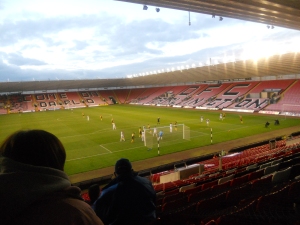 Once events had turned against us, you look to the bench for a change but Akinde and Ben Swallow, who replaced Reece for the final half hour and performed well, were pretty much the only realistic options available for Trollope to turn to. Harry Pell, Lamar Powell and Darren Jefferies are kids, nothing wrong with that but not who you want to see on the bench for this sort of game situation. Our resources are painfully thin and just got a whole lot thinner with Hoskins’ injury. Welcome to the long, hard winter everyone.
Once events had turned against us, you look to the bench for a change but Akinde and Ben Swallow, who replaced Reece for the final half hour and performed well, were pretty much the only realistic options available for Trollope to turn to. Harry Pell, Lamar Powell and Darren Jefferies are kids, nothing wrong with that but not who you want to see on the bench for this sort of game situation. Our resources are painfully thin and just got a whole lot thinner with Hoskins’ injury. Welcome to the long, hard winter everyone.
Finally, a generous and whole hearted hats off to Darlington FC and their supporters. Criticisms of their tackling aside it was a great performance and they thoroughly deserved to go through. It’s fair to say that Darlo have earned some good times after the last few years and you just couldn’t begrudge them their joy at the final whistle. It’s a very friendly place to visit, smiling stewards and no cockiness outside before or after the game. Good luck Quakers for the rest of your Cup run and in the league this season.
So, the season rests on the Wycombe game now…

